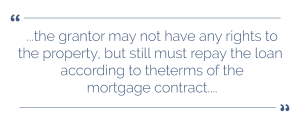

Updated on August 31, 2023
What happens after signing a quitclaim deed while you are still on the mortgage for the property? Below we’ll be discussing what this all means and if there are any issues with these scenarios.
A quitclaim deed transfers the same interest in a property that the grantor of the quitclaim deed had at the time the grantor signed the deed. Unlike a grant deed, which presumably transfers all rights in the property to the grantee, a quitclaim deed only transfers whatever rights and interests the grantor had at that time. The granter does not even have to know what rights they have in the property if they execute a quitclaim deed – all they are doing is granting whatever they have.
In contrast, a mortgage is simply a contract in which a loan is provided to a mortgagee for which a property serves as the security for the repayment of the loan. In California, we use a deed of trust as opposed to a mortgage to reflect to the existence of the loan and a deed of trust is the preferred manner in which loans are secured in California.

Knowing the difference between these types of documents provides insight about how they interact.
Most commonly, a property owner may wonder what happens when they sign a quitclaim to transfer their interest in the property, but are still on the mortgage for the property?
The short answer is that the quitclaim deed grantor will still be on the hook for the repayment of the mortgage or deed of trust even though they may no longer be the owner of the property (no longer on title).
In other words, the grantor may not have any rights to the property, but still must repay the loan according to the terms of the mortgage contract.
This gives the lender the option to go after the borrower or the property but generally not both because of the one form of action rule.
Thus, when a property owner decides to sign a quitclaim deed, the property owner should simultaneously arrange for the grantee to assume to the mortgage on the property.
Essentially the grantee assumes the mortgage by agreeing to pay the obligation secured by an existing trust deed or mortgage on the property that is being conveyed.
The one caveat with this arrangement is the owner of the deed of trust (e.g., the bank), will likely need to approve the assumption to ensure that the grantee is financial capable of making the payments (just like when the bank took measures to ensure that the original grantor was credit worthy enough to be entitled to the mortgage).
Thus, any property owner contemplating a quitclaim of their property should keep these issues in mind because simply signing a quitclaim deed does not mean all the accompanying obligations related to the property will automatically pass to the grantee.
Moreover, if you sign a quitclaim deed without informing your lender, the terms of the deed of trust (mortgage) for the property may give the lender the option to call the loan as being immediately due because of the transfer or sale clause in the security instrument.
For help analyzing a past, present or future quitclaim deed in California please do not hesitate to contact us. We constantly litigate title disputes and understand how to avoid them and how to best position our clients for success when they are in the middle of a title dispute. You can call us directly at (310) 954-1877, text us at (310) 706-2265, or send us a message here.